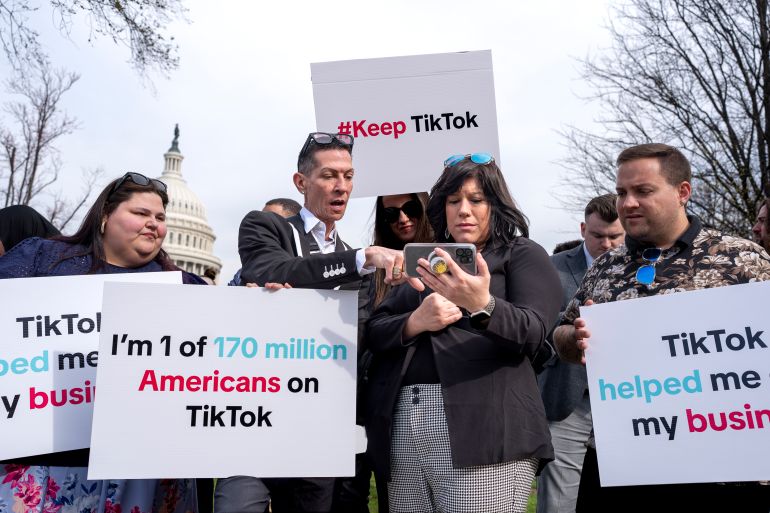TikTok Faces Potential U.S. Ban After Federal Appeals Court Ruling
TikTok is now facing the threat of a U.S. ban after losing its appeal to overturn a law requiring its parent company, ByteDance, to sell the popular social media platform. A federal appeals court upheld the ruling on December 6, 2024, marking a critical deadline for ByteDance to divest by January 19, 2025, or see TikTok removed from app stores nationwide.
The decision has intensified debates surrounding national security, free speech, and the future of TikTok in the U.S., affecting millions of users and creators who depend on the platform.
Read more: Beyoncé tickets, Bali trips, and book deals: USA Justices' 2024
Key Points from the Court Ruling
National Security Concerns
The court emphasized the bipartisan rationale behind the law: protecting U.S. citizens from potential threats posed by foreign adversaries. Lawmakers have expressed fears that the Chinese government could use TikTok to collect sensitive data or manipulate content.
“This legislation is a necessary step to safeguard American interests,”the ruling stated, reinforcing claims that ByteDance’s ownership poses risks to U.S. national security.
TikTok’s Legal Arguments Rejected
TikTok argued that the law violates the First Amendment rights of its 170 million U.S. users, claiming it would unfairly suppress free expression. However, the court dismissed these concerns, stating that the government’s actions aim to protect free speech from potential foreign influence, not restrict it.
Deadline for Divestment
ByteDance must sell TikTok by January 19, 2025, or face the consequences:
- Removal of TikTok from major app stores like Apple and Google.
- An effective ban that would make the app inaccessible to U.S. users.
This deadline leaves ByteDance with limited time to find a buyer, intensifying pressure as the global tech community watches closely.
Supreme Court Appeal: TikTok’s Last Hope
TikTok has announced its intention to appeal the ruling to the Supreme Court, framing the legislation as an unconstitutional overreach of government power.
Legal experts suggest that the case could draw the attention of the Supreme Court due to its implications for both free speech and national security. If the Supreme Court declines to hear the case or rules against TikTok, the ban will take effect.
Political Context Surrounding the Ruling
The ruling aligns with escalating U.S. efforts to counter Chinese influence in technology and media. Signed into law by President Joe Biden in April 2024, the legislation reflects growing concerns about foreign ownership of platforms with significant influence over American users.
This law is part of broader initiatives addressing the risks posed by Chinese-owned technologies, including the Huawei ban and restrictions on Chinese investments in U.S. critical infrastructure.
What the Ban Means for TikTok Users
Impact on Creators and Businesses
A potential TikTok ban would significantly disrupt the livelihoods of millions of content creators and businesses:
- Influencers who rely on TikTok for income may lose their primary audience.
- Small businesses leveraging TikTok for marketing face challenges in reaching their customers.
Many creators are already diversifying to platforms like Instagram Reels and YouTube Shorts to mitigate risks.
TikTok’s Response
In a statement following the ruling, TikTok criticized the law as an “extraordinary and unconstitutional assertion of power,” arguing that it is based on “misguided assumptions about data security.”
The company insists that it has taken steps to address these concerns, such as hosting U.S. user data on domestic servers through its “Project Texas” initiative. However, these efforts have failed to assuage lawmakers’ fears.
Broader Implications for the Tech Industry
Precedent for Foreign-Owned Apps
The ruling could set a precedent for future actions against foreign-owned apps, signaling that U.S. lawmakers are willing to take aggressive measures to protect national interests.
Free Speech vs. National Security
The case raises critical questions about balancing freedom of expression with national security concerns. While TikTok has become a platform for creativity and connection, the government argues that protecting users from potential threats takes priority.
The Road Ahead
With the January 19, 2025, deadline fast approaching, TikTok and ByteDance face significant hurdles:
- Finding a buyer for TikTok within the tight timeline.
- Securing a favorable ruling from the Supreme Court.
For millions of American users, the future of TikTok hangs in the balance, as the platform’s legal and political battles could reshape the digital landscape.
FAQs
Q: Why is TikTok facing a U.S. ban?
A: Due to national security concerns about data privacy and foreign influence, TikTok’s parent company, ByteDance, has been ordered to divest from the app.
Q: When is the deadline for ByteDance to sell TikTok?
A: ByteDance must sell TikTok by January 19, 2025, or face an effective U.S. ban.
Q: What will happen if TikTok doesn’t comply with the ruling?
A: If ByteDance fails to divest, app stores like Apple and Google will be required to remove TikTok, making it inaccessible in the U.S.
Q: Can TikTok appeal this decision?
A: TikTok plans to appeal the ruling to the Supreme Court, which could be its last opportunity to overturn the law.
TikTok’s ongoing legal and political battles highlight the evolving relationship between technology, national security, and global influence. As the clock ticks down to the January deadline, the world watches closely to see how one of the most influential apps of our time will adapt—or if it will disappear from the U.S. altogether.

